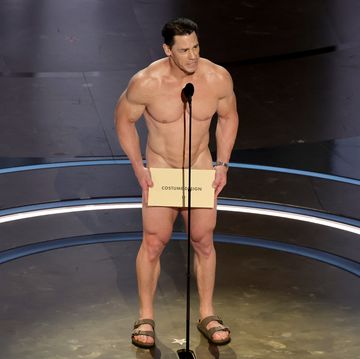Looking at him, you wouldn't believe Daniel Radcliffe has just woken up. Iced coffee in hand, wearing a tightly fitted green t-shirt and sporting a beard, he appears at ease with himself. It's just after 2pm at the Soho Hotel in London, but having grown up on film sets Radcliffe is used to sleeping whenever he can.
Against the former child star stereotype, the 27-year-old is known for being unusually polite and his blue eyes are lit with a concentration that never wavers while we talk. He doesn't drink any more and avoids social media, because beer draws him to chaos and Twitter to fights.
This month sees him play an undercover neo-Nazi in Imperium and a farting corpse washed ashore in Swiss Army Man - par for the course, perhaps, for an actor who has deliberately sought out challenging roles in his post-Potter phase. We sat down with him to talk about nationalism, feminism and modern masculinity.
How did you prepare for Imperium? Did you work closely with ex-undercover officer Mike German who the role is based on?
The most interesting part of making the film was sitting down with Mike and hearing his stories. I picked his brains about how he lived that way and what struck me the most was what a measured and contained guy he is. You immediately see how it helps in tense situations, not rising to provocation, so I took that into the part.
I also read a lot of bleak white supremacist literature and went on their websites and message boards. The most common reaction to watching Imperium is people saying, "But this doesn't really still exist right?" and it fucking does, it's right there.
ESQ: What was the most interesting finding from that research?
DR: There are so many different types of supremacists, from skinhead punks to more refined, intelligent members of the movement who look down on the violent thugs because they - bizarrely - care about their PR image.
Reading about the breadth of beliefs is strangely comforting, because you realise if they were ever in positions of power they would tear each other apart.
The film highlights the fact that the media largely ignores white terrorism. Do you think, gives the resurgence of the far right in mainstream politics, it is particualrly important this story is told now?
Absolutely. There are people in the world who want us to believe that only one group of people are responsible for terrorism, and it's sad to see that idea is turning us against each other. My dad is Northern Irish, so the knowledge that white people can create terrorism was in-built in me.
When we made the film it was still at the point where people were laughing at the idea of Trump becoming President, but what is happening now is terrifying.
I understand patriotism and I love the UK but what upset me most about Brexit is that patriotism now has nationalistic overtones, when it shouldn't. The less stock put into names and flags the better because we're all the same species.
You have to assume a fake character that is racist and anti-Semitic. How difficult was it using that language?
It was horrible. I kept going up to the actors I was shouting at and trying to have a nice conversation in-between. Those words have a real power still and the people on the next street might hear me yelling and not know we're filming. Honestly, I'm glad it felt weird because otherwise I'd be worried.
You openly talk about being a feminist. What do you make of modern masculinity?
Masculinity is in a really weird place at the moment. Men used to be able to be intelligent and sensitive but also tough as nails and those things didn't have to be mutually exclusive. Now the pressure to feel macho often comes at the cost of equality.
I think it is reflected in the men's rights movements. It doesn't feel like we've learned anything. You have to accept on some level that as a white man, the world is pretty much your oyster. When you hear people saying, "we're the ones being oppressed," you just think, Jesus, look around you. I'm still asked about being a feminist like it's something I have to 'come out' as.
You posted a tribute online when Alan Rickman died, despite not really using social media Why did you feel compelled to do that?
It's not that I believe you need to grieve publicly in order to feel something. But there was something that happened in the wake of Alan's death where everyone wanted to talk about his characters, and I wanted to say to say what a remarkable person he was as well. His unflinching loyalty to his friends is something you don't often see and his memorial was a real testament to how nurturing he was, particularly to young people.
Imperium is released 23 September and Swiss Army Man is released 30 September














